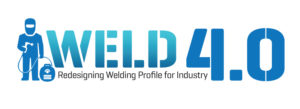Weld 4.0 will have a profound impact on the skills and competences required of welding professionals, as well as learning methodologies, bringing them into the Digital Age.
 As most companies in Europe continue powering ahead to get into the Digital Age of Industry 4.0, they need to ensure their professionals’ qualifications are updated with digital welding skills and competences to keep up with these changes. In fact, a survey of business leaders in Germany has singled out education and training of qualified professionals as one of the key areas that required improvement as they made this transition. The Weld 4.0 project addresses this challenge by piloting the redefinition of the European Welder professional profile to include the required digital welding skills and competences, to be learned through the use of novel information and communication technologies (ICT) and Vocational Education and Training (VET) methods, including Game Based Learning and Serious Gaming. The project will focus on the new European Systems for Qualification, EQF and ECVET, initially targeting 3 countries – United Kingdom, Germany and Portugal. Once completed, the new curriculum will then be available across Europe, with its contents and tools tested and developed to ensure a broad deployment, informed by feedback from the target groups, experts, policy makers and other regional/ national stakeholders.
As most companies in Europe continue powering ahead to get into the Digital Age of Industry 4.0, they need to ensure their professionals’ qualifications are updated with digital welding skills and competences to keep up with these changes. In fact, a survey of business leaders in Germany has singled out education and training of qualified professionals as one of the key areas that required improvement as they made this transition. The Weld 4.0 project addresses this challenge by piloting the redefinition of the European Welder professional profile to include the required digital welding skills and competences, to be learned through the use of novel information and communication technologies (ICT) and Vocational Education and Training (VET) methods, including Game Based Learning and Serious Gaming. The project will focus on the new European Systems for Qualification, EQF and ECVET, initially targeting 3 countries – United Kingdom, Germany and Portugal. Once completed, the new curriculum will then be available across Europe, with its contents and tools tested and developed to ensure a broad deployment, informed by feedback from the target groups, experts, policy makers and other regional/ national stakeholders.
This profound change will bring innovation and increased interest from new generations to an existing professional profile. As the European Union aims to increase the labour market relevance of manufacturing, including welding, while simultaneously reducing skills mismatches and shortages through updates of vocational education and training, Weld 4.0 will redefine the European Welder profile, ensuring its long-term ability to respond to new and future job requirements.
Integrating new and innovative technologies and methodologies
The new digital age brings to the traditional shop floor the most recent and advanced technologies, from Internet of Things to intelligent robots and machines, empowering companies with additional flexibility in manufacturing, mass customization, increased speed, better quality and improved productivity. As a result, employees now face the need to fully embrace training for digital skills. But, as ICT and automation continue taking over manufacturing, there are many manual processes, such as welding, that play, and will continue playing in the foreseeable future, a large role in the manufacturing industry, creating the need to bring ICT training to all the professionals that currently do not benefit from it. But the current approach to education is usually classroom face-to-face theoretical training and applied shop floor welding. Regardless, in order to succeed in today’s digital world, trained welders must increase their IT knowledge.
The Weld 4.0 project has put forth ambitious goals, from redefining the European Welder profile to improving the quality of qualification programs related to welding on transparency and recognition between the European Countries. It is also actively fostering the promotion of new learning opportunities in an international and diverse scenario, beginning with the pilot training in the languages from the consortium members – English, German and Portuguese. Lastly, the project will pursue the promotion of new learning opportunities for welding professionals.
To also bring training and learning methodologies into the digital age, the project will look at the development of an innovative ICT training solution potentially including Welding Simulators, Game Based Learning, and Serious Gaming. Game-based learning is a new and innovative teaching method that allows learners to explore playfully different parts of a scenario. Games are typically designed for different ability levels and with the goal of helping the players to retain the information that they learn and apply it to other problem-solving situations, but can also be implemented as a collaboration between learners and educators.
As an end-result, the project will increase the digital, social and cultural competences of VET trainers and teachers, making them better able to deal with any target group, while the use of European tools (like ECVET and EQF) will ensure complete transparency and mobility of the trained personnel across Europe, boosting qualification transferability.
Partners
Project partners include HighSkillz, that creates advanced and effective game-based learning solutions; The European Federation of Welding, Joining and Cutting (EWF); ISQ, a provider of scientific and technological support in Industry and Services; and lastly, Bremer Institut für Produktion und Logistik GmbH (BIBA), an engineering research institute developing technical and organizational solutions for tasks from various areas of production technology.
About the European Federation for Welding, Joining and Cutting
EWF is a pioneer in implementing a harmonised qualification and certification system for joining professionals. Through European projects, EWF has been innovating in training methodologies, and involved in the development of new technologies and uses for joining. Through its member organisations, EWF has established a firm link to the local industry, providing knowledge and training as well as participating in research initiatives that address the most pressing questions and challenges in the field of joining technologies.



